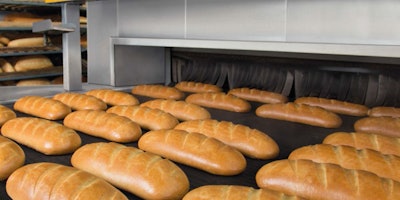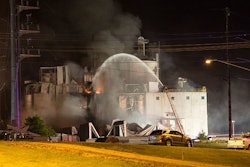
Kluber Lubrication North America
At high temperatures, common food-grade chain oils can
evaporate and break down, leaving behind high levels of residue
and/or requiring constant relubrication. A common alternative
is to use a chain lubricant containing suspended industrial
solids that will provide emergency lubrication even when the
carrying fluid evaporates. Although these formulations can
provide high-temperature lubrication, it is often accomplished at
the sacrifice of the lubricant no longer being registered by the
National Sanitation Foundation (NSF) as food-grade H1.
New Klüberfood NH1 CH 6-120 SUPREME provides
optimum protection of chains at extreme temperatures. The
formulation utilizes a solid white lubricant and is NSF H1
registered for incidental contact, providing a long-lasting
solution to the challenge of using food-grade lubricants at
extreme temperatures.
Meeting the demands of extreme temperature
applications in food processing
In all industries, but particularly in the food industry, it is valuable
to understand the makeup of the lubricant that is applied to
equipment operating at elevated temperatures.
In addition to other areas, the various base oils used in lubricants
are affected by extreme temperatures in the levels of evaporation
loss and in the formation of residues—factors that influence
chain life.
White Paper
White Paper Klüberfood SUPREME
16.09 Edition KLUSA
Keep oven chains protected,
even at extreme temperatures
– Bakery ovens used in the production of tortillas, pita bread, pizza dough and other baked goods can expose
conveyor chains to extreme temperatures upward of 1000°F (537°C), which can significantly challenge typical
food-grade lubricants.
– Klüberfood NH1 CH 6-120 SUPREME is a major development for bakeries looking to provide optimum protection for
chains at extreme temperatures, while continuing on the path toward food safety.
Conveyor chains in bakery ovens are exposed to extreme temperatures
upward of 1000°F (537°C), which can significantly challenge typical
food-grade lubricants, such as synthetic esters that can evaporate at
temperatures above 500-600°F (260-315°C).
Each type of base oil has a different temperature limit—and
even going slightly past this limit can have a dramatic effect.
For instance, at temperatures above 500-600°F (260-315°C),
even synthetic esters, which are excellent performers in many
bread ovens, can evaporate. As a result, frequent relubrication
is needed to keep the chain lubricated and protected. However,
even with constant relubrication, the continuous break down
of certain types of base oils can thin the lubrication barrier,
which reduces component protection. Also, residue levels
become higher, which impairs fresh lubricant from reaching the
intended surface(s).
A common method used to lubricate chains operating at extreme
temperatures is to use a solid lubricant. The solid lubricant is in
suspension within a fluid carrier when the lubricant is applied. As
the fluid carries the complete formulation into the components
and begins to evaporate, the solid stays behind inside the friction
points as a type of emergency protectant to decrease wear of
the surfaces.
Understanding the importance of the types of carrier fluid and
solid being used is critical. As with any formulation, they should
be selected based on the complete tribological environment.
Other important factors include how the lubricant will be stored,
the method in which it will be applied to the chain and when it will
be applied.
A lubricating formulation using solids held in suspension is likely
to require mixing either when being stored or prior to application.
Stirring can be done with various methods, such as using an
agitator pump inside the lube reservoir. Agitation maintains
the proper ratio of the fluid carrier and the solid lubricant(s)
during application, which can then be done using an automatic
lubrication system.
Because the carrier will eventually evaporate, the application
should be performed at a temperature allowing the carrier to first
deliver the additives into the friction points. Otherwise, if applied
while the oven is at full or too high a temperature, heavy smoking
and flashing off of the oil will occur when it contacts the chain.
It is best to apply the lubricant at a lower temperature within
the operating range of the carrier to allow penetration of the
solid additives.
Advanced protection for oven chains
at extreme temperatures
Klüberfood NH1 CH 6-120 SUPREME uses a carefully selected
synthetic base oil as a carrier with a white solid lubricant held
in suspension. The base oil evaporates off cleanly with very
little residue, which provides the best protection possible from
the solid lubricant. This formulation has excellent wetting and
penetration properties on application, and can be used at
operating temperatures even up to 1200°F (650°C).
At the same time, it provides excellent long-term performance
while maintaining high industry standards for food safety.
Klüberfood NH1 CH 6-120 SUPREME is registered as food grade
H1 by the NSF.
White Paper
Keep oven chains protected,
even at extreme temperatures
White Paper Klüberfood SUPREME
16.09 Edition KLUSA
Temperature limits of synthetic food-grade
lubricants suitable for chains
1200°F
(648°C)
Klüberfood NH1 CH 6-120
SUPREME
600°F
(315°C)
Ester-type lubricants
White Paper Klüberfood SUPREME
16.09 Edition KLUSA
Save time and money while supporting
food safety
Along with performance and food safety advantages, Klüberfood
NH1 CH 6-120 SUPREME protects components to extend chain
life, reducing maintenance issues. Additionally, relubrication
periods are extended—upward of one or two weeks—as the
solid lubricants become impregnated into the metal surfaces. The
synthetic oil provides good corrosion protection and, along with
the solids, exhibits excellent wear behavior, which also enhances
chain life.
To ensure optimum lubrication and performance, Klüberfood NH1
CH 6-120 SUPREME must be properly applied. If a solid lubricant
solution has already been used, the same application procedure
can be followed. Typically, a solid lubricant in fluid suspension is
applied at lower temperatures to reduce smoking and to ensure
that the carrier penetrates into the chain components. Application
at chain temperatures below 302°F (150°C) is recommended
during planned maintenance or periodic downtimes.
The reservoir holding the lubricant, if automated lubrication is
used, should employ an agitation or stirring method. Agitation
ensures that the solid lubricant stays in suspension. Application
frequency should be reviewed with the lubricant manufacturer,
particularly when switching from alternatives or working with a
newer chain.
The solid white lubricant formulation (left) of Klüberfood NH1 CH 6-120 SUPREME is NSF H1 registered for incidental contact, providing a food-grade solution
for chain lubrication at extreme temperatures without the residue of typical lubricants (right).
Comparing Klüberfood NH1 CH 6-120 SUPREME synthetic
oil with an ester lubricant when used above 600°F
Klüberfood
NH1 CH 6-120 SUPREME
High-Temperature
Ester Lubricant
1200°F (650°C) upper
operational limit
600°F (315°C) upper operational
limit
Example: 1- to 2-week
application intervals in
established practice
Requires continuous and costly
reapplication
Cleaner burn off with low residue Burn off leaves higher levels of
residue
White Paper
Keep oven chains protected,
even at extreme temperatures
In addition to high-temperature performance and NSF
H1 registration, Klüberfood NH1 CH 6-120 SUPREME is
ISO 21469 certified. ISO 21469 certifies that the lubricant has
been produced and packaged following hygiene requirements
established by the standard.
Solving the dilemma of extreme-temperature
performance and food-grade certification
In the past, bakery operators and manufacturers faced a likely
dilemma: either provide the best protection possible for the
equipment without using a food-grade lubricant, or switch to
an NSF H1 lubricant with the expenses of higher lubricant
consumption and shorter equipment life.
For bakeries in either situation, Klüberfood NH1 CH 6-120
SUPREME provides a single solution. Proven in baking
applications, this advanced formulation provides excellent
high-temperature performance as well as food-grade NSF H1
registration and ISO 21469 certification to meet demanding
hygiene requirements.
For more information, please contact Klüber Lubrication at
[email protected].
Klüber Lubrication NA LP / 32 Industrial Drive / Londonderry, NH 03053 / Toll Free: 1-800-447-2238 / Phone: 603-647-4104 / Fax: 603-647-4106
Innovative tribological solutions are our passion. Through personal contact and consultation, we help our customers to be successful worldwide, in all industries and markets. With our ambitious
technical concepts and experienced, competent staff we have been fulfilling increasingly demanding requirements by manufacturing efficient high-performance lubricants for more than 80 years.






















